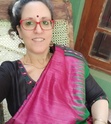Marcy Jane Knopf-Newman's Blog
April 17, 2025
On StoryGraph
April 12, 2024
Tax resistance
To Whom It May Concern at the IRS:
I have decided to stop paying my US taxes because I’m fed up with watching the federal government spend trillions of dollars on the destruction of human beings across the planet. This has been going on far too long and I refuse to spend a single cent on the genocide of the Palestinian people.
Rather than waste my time filing out my tax forms I’m sending the exact amount that I was required to pay last year – $2,168 – to two charities of my choice because I know the money will be better spent in their hands than in yours.
The first half has been sent to Middle East Children’s Alliance and the second half has been sent to UNRWA.
I know that there are many things Americans could benefit from with tax money – from healthcare to education – but in spite of millions of Americans putting money into the pot every year, you continue to squander the funds on the military industrial complex. You have shown yourself to be irresponsible when it comes to managing and budgeting your (really our) money.
I’m grateful to the National War Tax Resistance Coordinating Committee for their incredibly helpful webinars and resources that showed me various ways of resisting taxes. If you are curious and want to get started check out their YouTube channel. Also, Al Jazeera’s “The Take” podcast this week covers tax resistance in the US.
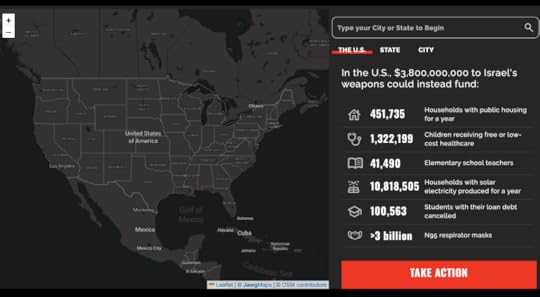
You can see where it did go and where it could have gone.
Also the National Priorities Project will show you even more specifically which private contractors your tax dollars are going to fund within the military industrial complex:

If you put in the figure of federal taxes paid, they will issue you a tax receipt showing where your money has gone. Here is where mine would be going had I paid my taxes:
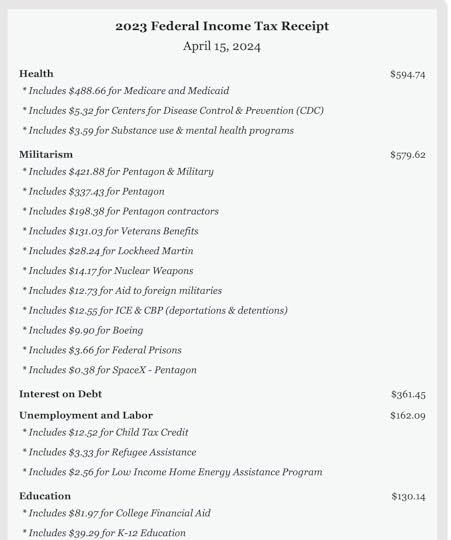
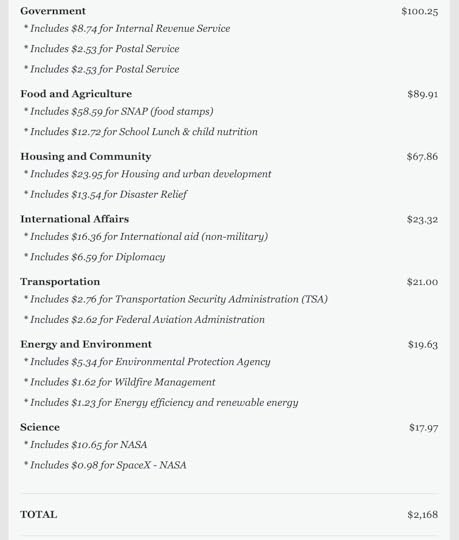
You can use these websites to declare a specific amount of your taxes that you want to offset for Gaza as well.
And below please find and share these wonderful visuals from Visualizing Palestine to promote USPCR’s Not My Tax Dollars campaign.
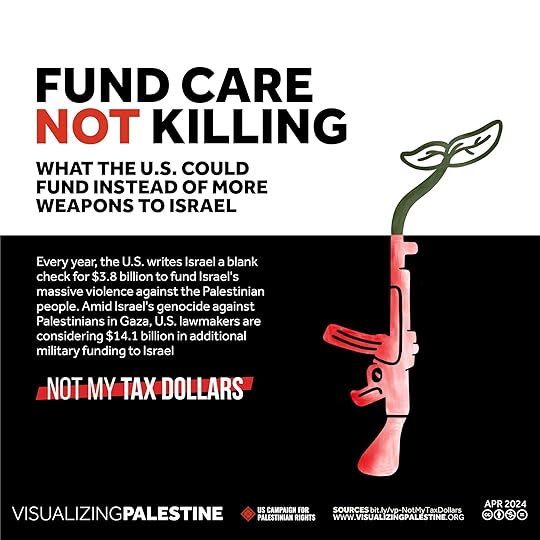
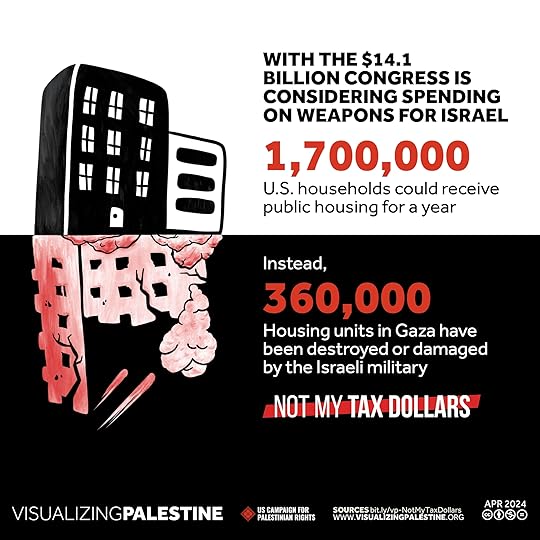

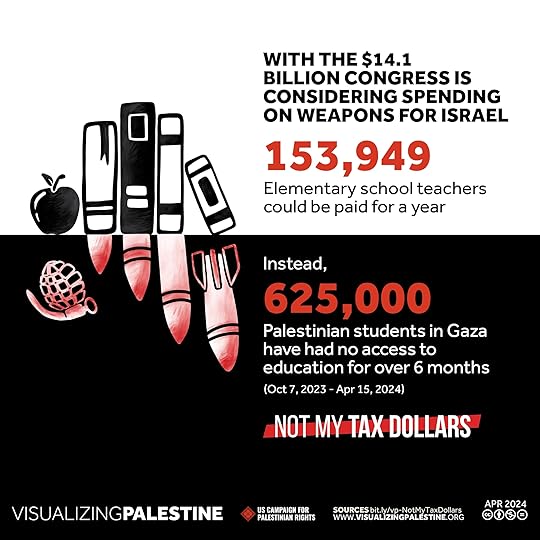
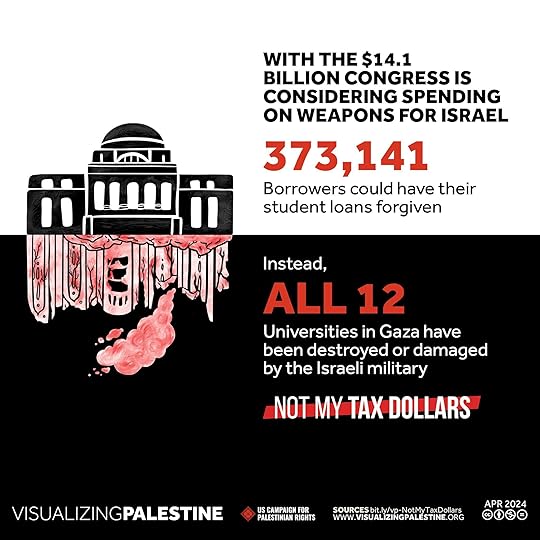
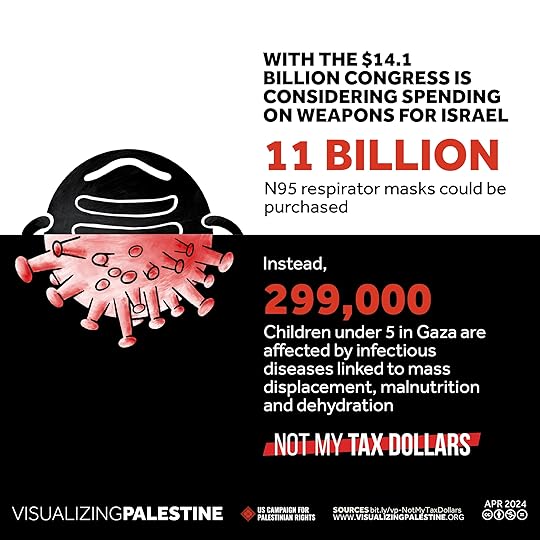
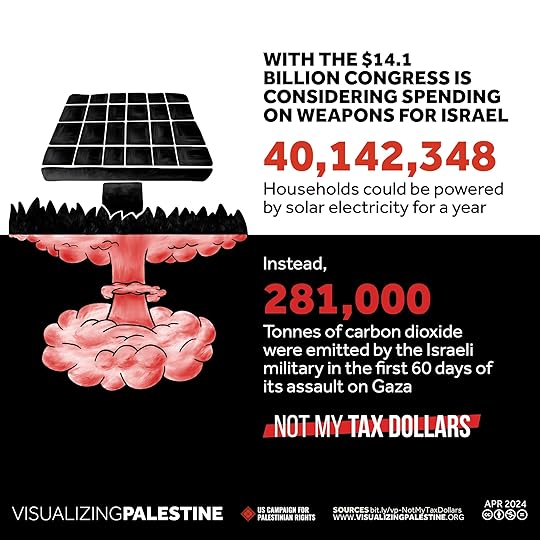
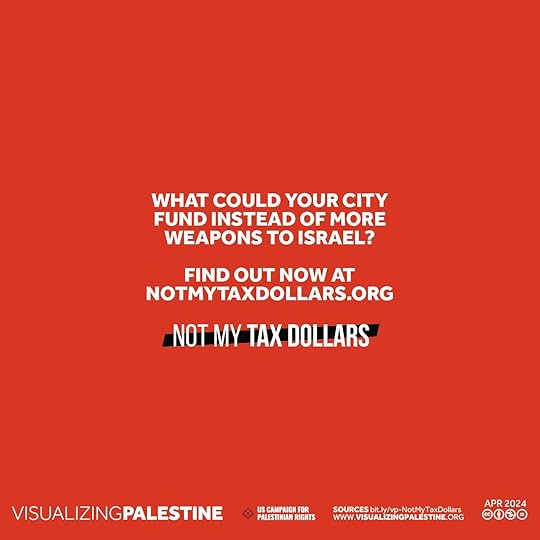
Thank you for reading this letter.
Yours truly,
Marcy Jane Newman
January 28, 2024
On holocausts and genocide
Yesterday was Holocaust Remembrance Day. It’s a day that should be dedicated to never again for anyone. It’s a day that shouldn’t be particularizing Jewish people and their past trauma. How deep is the irony that the ICJ ruling came out on the eve of a day that concedes Israel is engaging in genocide?
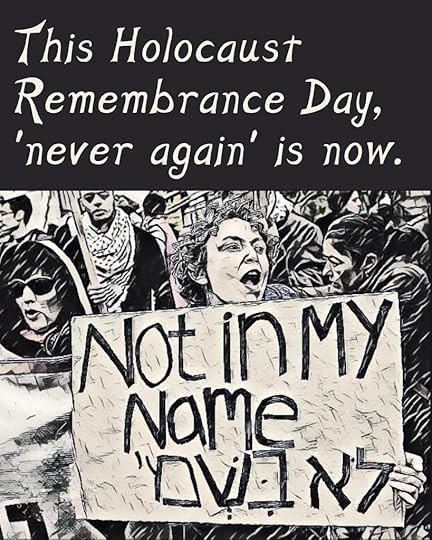
Ruling that Israel must cease its genocidal acts is historic. Although the judges didn’t explicitly use the language of ceasefire, they essentially called for a de facto ceasefire because of the six provisional measures they laid out to protect Palestinians. Genocide and Holocaust Studies Professor Raz Segal noted these key findings:
“The provisional measures did not include an order for a cease-fire, which South Africa had requested, but they did instruct Israel — by an overwhelming majority vote of the ICJ judges of 15 to 2 — to prevent any acts of genocide in Gaza and ensure that its military does not perpetrate such acts.
As part of the court’s provisional measures, Israel must also prevent and punish incitement to genocide; ensure the provision of urgent aid to Gaza; prevent the destruction of evidence and ensure its preservation; and provide the court with a report on these measures within a month. In effect, these orders do require a cease-fire, for there is no other way to carry them out.”
What remains to be seen is whether or not Israel will comply with these orders and whether the US will use its veto power in the UN Security Council to prevent taking action on this ruling. The case in the California courts, which began soon after ICJ’s announcement, Defense of Children International – Palestine v. Biden, could ideally bolster the ICJ’s ruling if it finds President Joe Biden, Secretary of State Antony Blinken, and Secretary of Defense Lloyd Austin complicit in the genocide of Palestinians in Gaza.
The frustrating thing about this – as with all genocides that have occurred since the Convention on the Prevention and Punishment of the Crime of Genocide was established by the UN in 1946 – is how many more humans have to die while we’re waiting for the legal apparatus to concur and act accordingly.
* * *
I grew up with my maternal grandparents for the first few years of my life. Every night my grandfather would put me to bed. We had a nightly ritual of saying prayers and, although its origin is Christian, we would recite the Golden Rule, something that to this day is embedded in my consciousness. In the mornings he would read the newspaper with me, and in the evenings I would watch Walter Cronkite read the news. Although I didn’t understand it at the time, he was quite horrified about what was reported about the brutality committed by US forces in Vietnam. It was a classic way for him to illustrate the Golden Rule. I don’t know how he would have felt had he lived to see me apply that as universally as I do. I don’t know how deep his Zionism ran. I don’t know how he would have reacted to witnessing the horror of the genocide in Gaza unfolding before us. These rituals punctuated my days just as much as our nightly prayers.
I’m certain it was this foundational experience that led me to beg my parents to join a synagogue. I was the one who requested that I begin Hebrew and Sunday school classes. I was the one who asked to become a bat mitzvah. And while those things did transpire, like many reformed Jewish kids of my generation, I never really learned Hebrew well enough to understand what I was reading. I also never read the Torah or the Tanakh (the Hebrew Bible). What I did learn was a lot about Israel and The Holocaust (read: presented as if it only happened to Jewish people) – so much it’s a miracle I didn’t go on one of those pre-Birthright summer programs. The two were inextricably linked in my synagogue education: because of The Holocaust, Israel must exist. In other words, I didn’t become a spiritual person at temple; instead I was trained to be a Zionist.
This phenomenon of young American Jewish children becoming foot soldiers for Israel can be seen quite powerfully in the new documentary Israelism. (There are some great interviews and clips of it on this segment of Democracy Now!) But this phenomenon of indoctrinating young American Jews with Zionism is a relatively recent phenomenon, one that coincides with the same trajectory that Norman Finkelstein laid out in his groundbreaking book, The Holocaust Industry:
“Two central dogmas underpin the Holocaust framework: (1) The Holocaust marks a categorically unique historical event; (2) The Holocaust marks the climax of an irrational, eternal Gentile hatred of Jews. Neither of these dogmas figured at all in public discourse before the June 1967 war; and, although they became the centerpieces of Holocaust literature, neither figures at all in genuine scholarship on the Nazi holocaust. On the other hand, both dogmas draw on important strands in Judaism and Zionism.” (52)
It was after the 1967 that these elements infected the Jewish education system in America. Curricula that previously revolved around the Tanakh (Torah), Hebrew, Yiddish, Jewish history, prayers, synagogue services, customs and ceremonies (something my book goes into depth about). After 1967 most of that was discarded in exchange for Zionism and Israel.
Such an education leaves you feeling as though your trauma is the only one that matters. As the film Israelism makes clear, such an education can leave one feeling alienated from their culture, religion, and even their family if they begin to learn and question the Zionism they were inculcated with as a child.
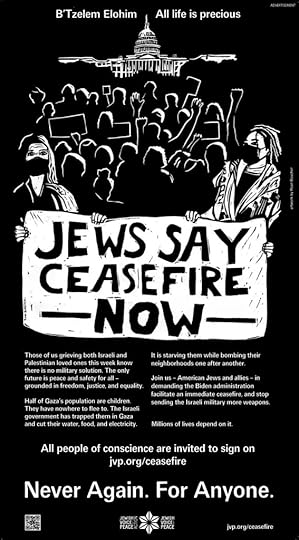
***
The original UN Resolution (60/7) from 2005 that commemorates Holocaust Remembrance Day, uses language that is universal rather than particular in its understanding of World War II’s genocide:
“Recalling the Convention on the Prevention and Punishment of the Crime of Genocide, which was adopted in order to avoid repetition of genocides such as those committed by the Nazi regime,
Recalling also the preamble of the Universal Declaration of Human Rights, which states that disregard and contempt for human rights have resulted in barbarous acts which have outraged the conscience of mankind.”
It requests that states create education programs about the Nazi Holocaust in order to “inculcate future generations with the lessons of the Holocaust in order to help to prevent future acts of genocide.”
In other words, the resolution understands that the point of historical lessons is to preclude them from repeating. In other words, marking this occasion means understanding that genocide, regardless of who is doing the mass murder or who is being killed, should be prevented by this act. In other words, never again for anyone.
And yet the Zionist Jewish people around the world continue to promote the fallacy that this is a uniquely Jewish event.
If you’re Israeli, you memorialize the Holocaust (Shoah in Hebrew) several times a year: in the spring with Yom Hashoah (Holocaust Remembrance Day), in the fall to remember Kristallnacht, Tish B’Av in the summer (which is actually marking the first and second temples’ destruction in Jerusalem rather than events in Europe), Tenth of Tevet in the winter (also related to the first temple’s felling), and of course the one the UN commemorates every year on 27 January. Just imagine what it must be like to grow up imaging yourself to be so persecuted that every season of the year you have a holiday to remember that.
***
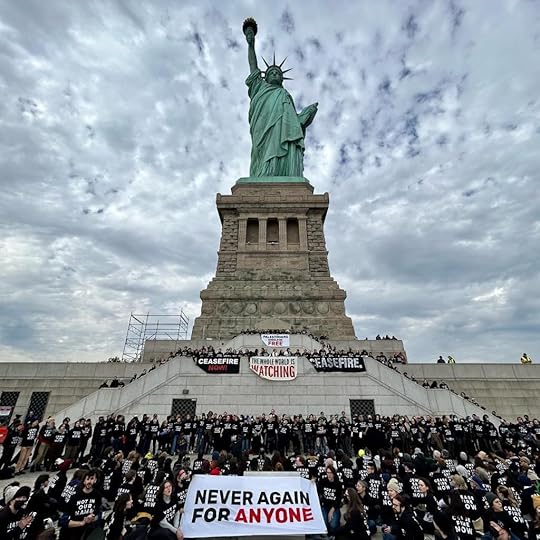
The dangerous and false equivalence between Judaism and Zionism left me feeling alienated from my religion, my culture, and much of my family for much of my adult life. It’s only in the past couple of years that I’ve become more involved with Jewish Voice for Peace that I’ve been able to feel reconnected. It is from that community that I was able to find people like Jessica Rosenberg and Brant Rosen who are anti-Zionists rabbis. Through these new connections I’ve been studying Torah for the first time in my life with Tzedek Chicago’s class that is comprised of a global community of anti-Zionist Jews.
Reading this seminal text at this midpoint in my life has awakened me to an understanding of Judaism, but perhaps more importantly I’m also beginning to see how the Hebrew Bible undergirds so much of Israeli violence. For example, early in Israel’s most recent genocidal campaign against Palestinians in Gaza, Netanyahu alluded to Amalek, which the Republic of South Africa quoted as one of the innumerable examples of genocidal intent:
“On 28 October 2023, as Israeli forces prepared their land invasion of Gaza, the Prime Minister invoked the Biblical story of the total destruction of Amalek by the Israelites, stating: ‘you must remember what Amalek has done to you, says our Holy Bible. And we do remember.’”
This week the Torah portion covered the introduction of Amalek who doesn’t seem to represent any particular set of people. But Amalek apparently picks a fight with the Israelites who have just left Mitzrayim (the land we know today as Egypt), although we’re not told why. What we are told is what God tells Moses regarding this altercation:
“Then יהוה said to Moses, ‘Inscribe this in a document as a reminder, and read it aloud to Joshua: I will utterly blot out the memory of Amalek from under heaven!’” (Exodus 17:14)
Amalek reappears and the line is repeated:
“Therefore, when your God יהוה grants you safety from all your enemies around you, in the land that your God יהוה is giving you as a hereditary portion, you shall blot out the memory of Amalek from under heaven. Do not forget!” (Deuteronomy 25:17)
This is what Netanyahu is alluding to when he suggests Palestinians are Amalekites. He’s equating the Israelites with the settler colonialists in Israel and the Amalekites with the Palestinians. In so doing, Netanyahu is very clearly stating that he doesn’t only want to erase Palestinians from Gaza – he also wants to wipe out any evidence of their existence, hence the fixation with destroying mosques, schools, universities, cultural centers. And as Tzedek Chicago’s cantor Adam Gottlieb astutely pointed out, Zionism’s failure is that it has prevented us from learning the lessons of the Nazi holocaust. We’ve remembered to forget the actual Nazi holocaust.
***
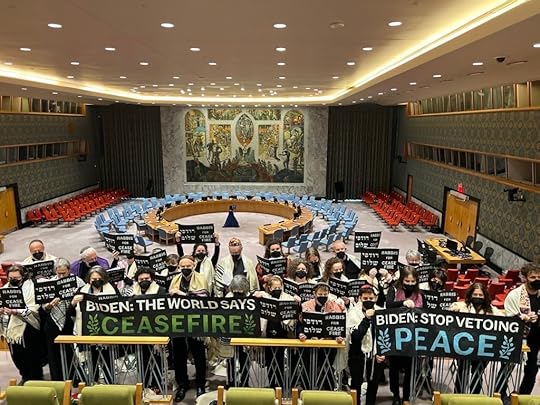
Zionism has made us forget what antisemitism is. It has made us forget that genocide is universal rather than particular. It makes us blind to the ways in which European Jews who colonized Palestine learned a great deal from their Nazi oppressors – from the Big Lie and hasbara (propaganda) and the art of genocide.
Scholars of genocide like Raz Segal and activists with Jewish Voice for Peace knew early on that Israel’s campaign against Palestinians in Gaza was genocidal. And now we have confirmation from the highest court in world.
“On this day of remembrance in 2021, you noted that, “The Holocaust was no accident of history.” As you stated, “It occurred because too many governments cold-bloodedly adopted and implemented hate-fueled laws, policies, and practices to vilify and dehumanize entire groups of people, and too many individuals stood by silently. Silence is complicity.”
President Biden, what is happening right now in Gaza is no accident of history — and your complicity has been anything but silent. We call upon you to be true to your word and end U.S. complicity in Israel’s genocide against the Palestinian people.
If the words “Never Again” have any meaning at all, they must mean “Never Again for Anyone.” We fervently ask of you: please honor the word and spirit of the International Holocaust Remembrance Day by using your office to bring a ceasefire to this tragic violence — and to stop blocking efforts toward building a truly just peace for all who live between the river and the sea.”
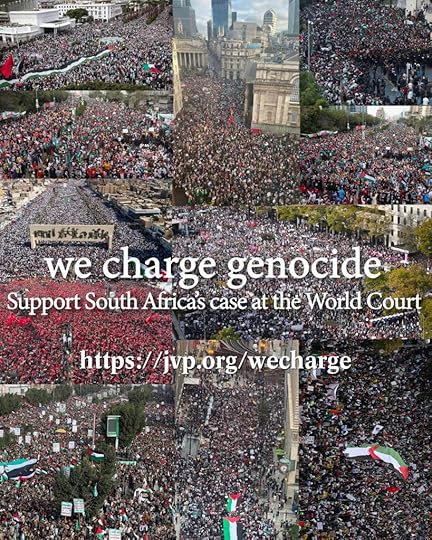
July 9, 2021
Teaching Indian students about Palestine
The other night I was invited by an old friend to dip my toe in the academic waters again to help launch BRISMES Campaigns, which was set up to advocate critical education on the Middle East, as well as implement BRISMES‘ resolution to adopt BDS. The event was held at the annual BRISMES conference and our panel focused on the relationship between education and activism. I was happy to share the Zoom stage with Omar Barghouti, Sara Salem, and John Chalcraft who recently co-authored an important report about Zionist meddling in Britain’s history curriculum.
On the panel, I spoke about my experience teaching Indian students about Palestine, in the literature classroom, at Rishi Valley School, in order to offer a more truthful understanding than their history class which grossly misrepresented West Asia on a number of fronts. Using a lot of the resources I discuss in my book, The Politics of Teaching Palestine to Americans, including Susan Abulhawa’s Mornings in Jenin, and films like Mai Masri’s Frontiers of Dreams and Fears, Arna’s Children, and Occupation 101, and Al Jazeera’s series Al Nakba.
I wrote about this at the time. RV, like a few thousand other private schools in India uses India’s Council for the Indian Certificate Examination ISC exam. It is that particular syllabus, as well as the British textbook used to teach the course, that portrayed a Zionist point of view. I hope to have a chance to study syllabi and textbooks used over time to get a clear sense of how India began to teach an ahistorical, incorrect narrative, especially as it relates to changes in India’s foreign policy with respect to Israel and Palestine. It’s in is incipient stages, but here are some findings from my talk. Also, if you want to watch the talk here’s the panel in its entirety.
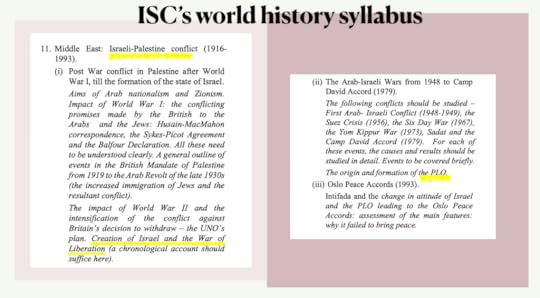
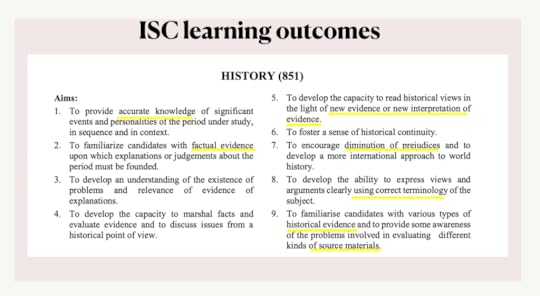
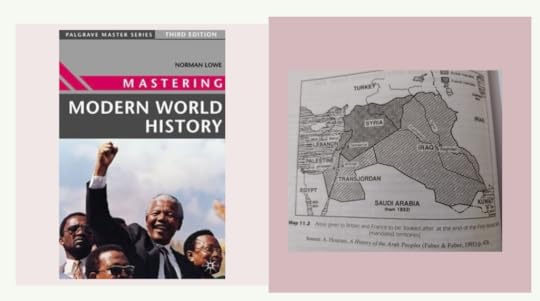
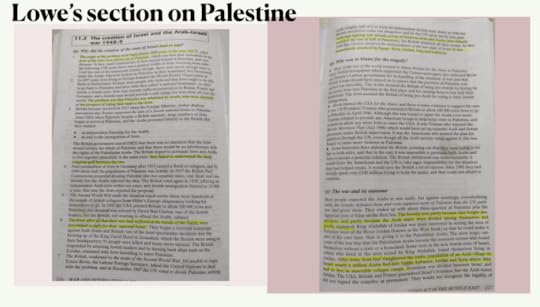
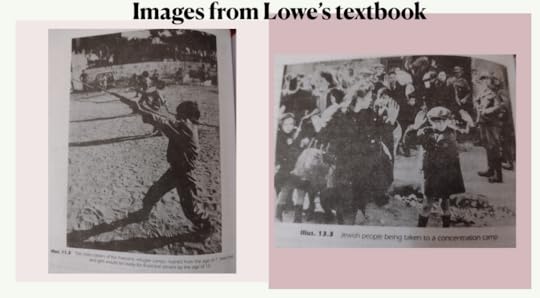
And here is a trajectory of key events in the relations between India and Israel-Palestine since Independence on to which I hope to trace how India’s history curriculum went from what I expect to have been anti-Zionist to its present-day Zionist state. What I suspect is that this will look a lot messier than one might anticipate given the way in which India has been inconsistent in its relationship with Israel and the Palestinians from the beginning.
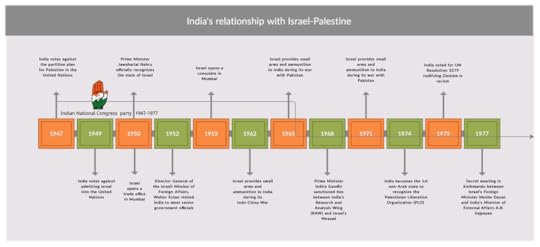
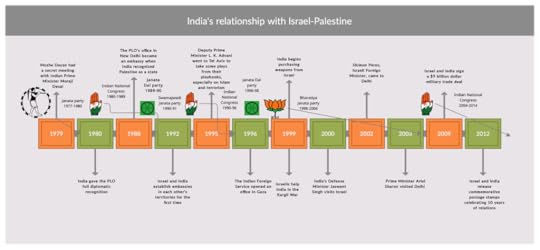
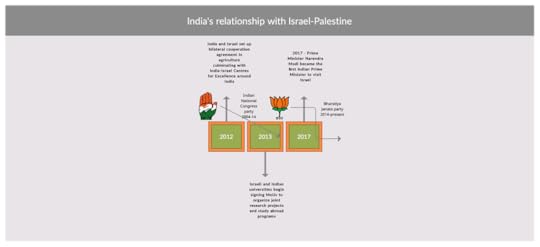
For me this education is important because without understanding the settler-colonial history and present in Palestine, it’s an uphill battle to recruit people to not only sign onto things like the Indian Campaign for the academic and Cultural Boycott of Israel, but also to do things like campaign against the MoUs and study abroad programs between Indian and Israeli universities. In the UK, there’s a terrific resource at the Palestinian Solidarity Campaign that helps activists research the relationships between British and Israeli institutions, which should be replicated globally. Likewise, just as it’s terrific news that Indian farmers recently signed on to BDS, it’s important that such a gesture translates into action, such as refusing to work with Israel’s Centre of Excellence being set up around the country.
May 15, 2021
The nakba in 25 images
Visualizing Palestine has produced an excellent set of infographics that help explain what’s happening and what’s been happening for over 70 years in Palestine.
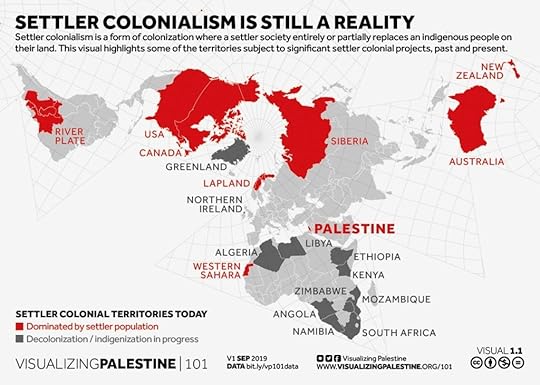
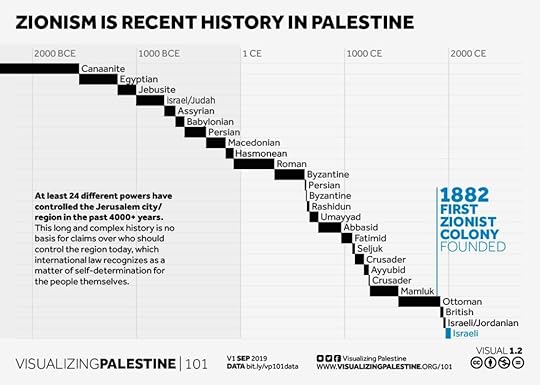
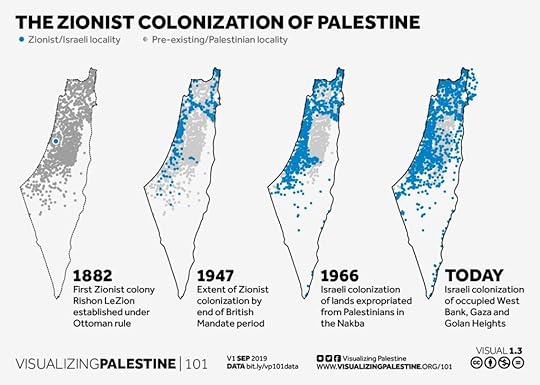
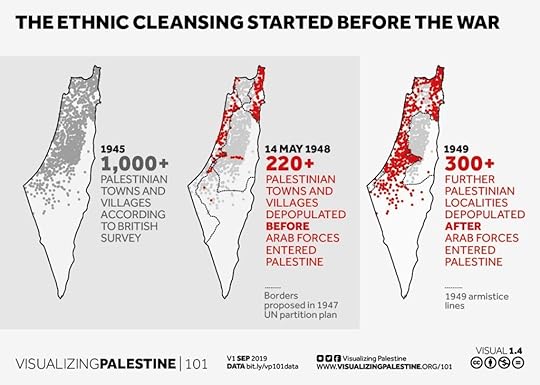
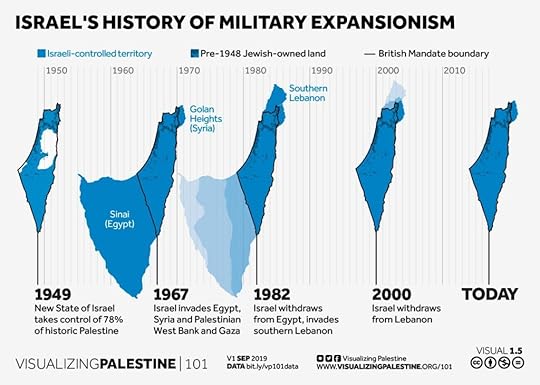
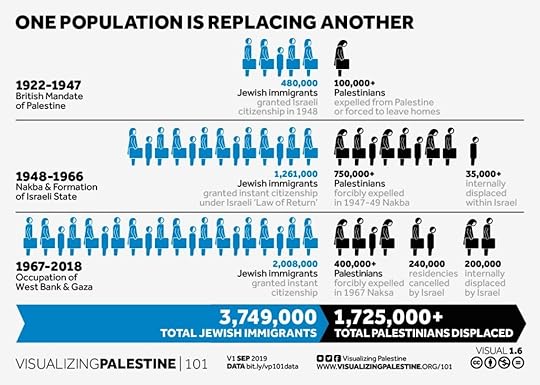
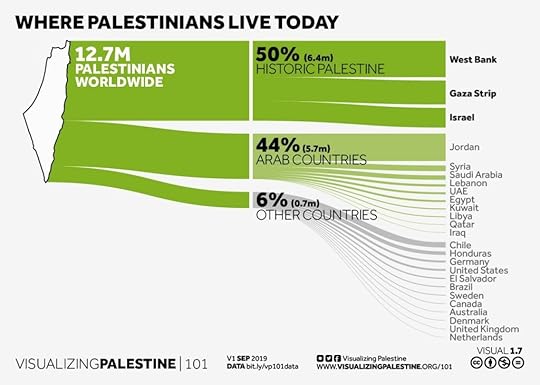

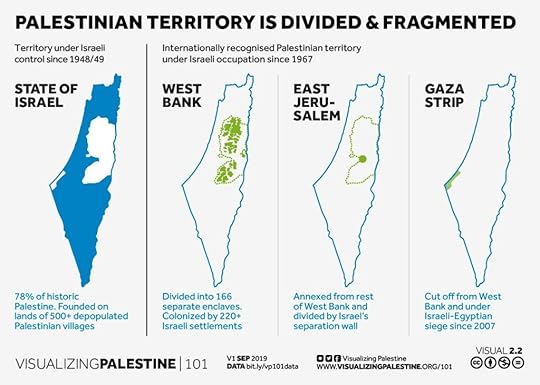
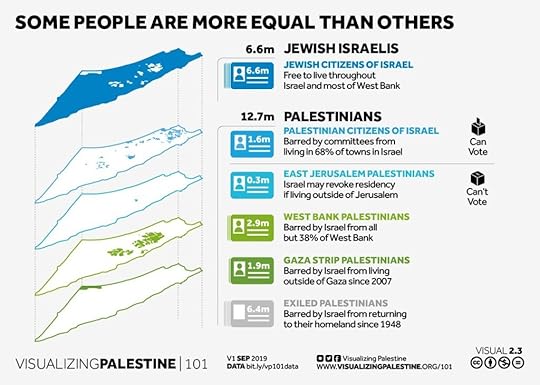
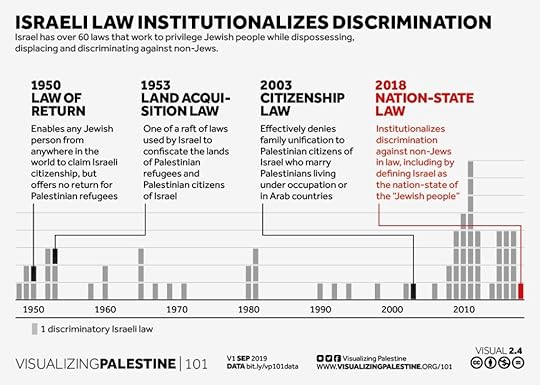
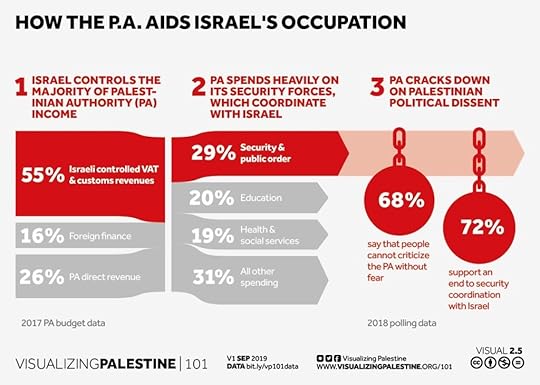
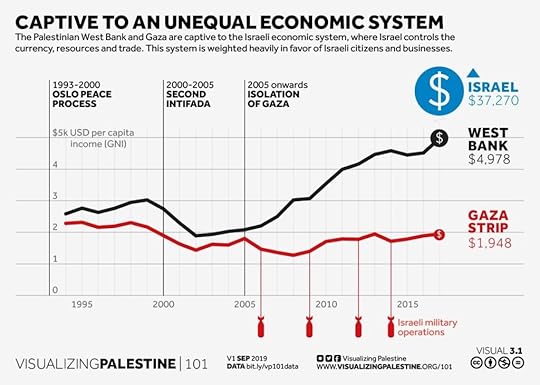
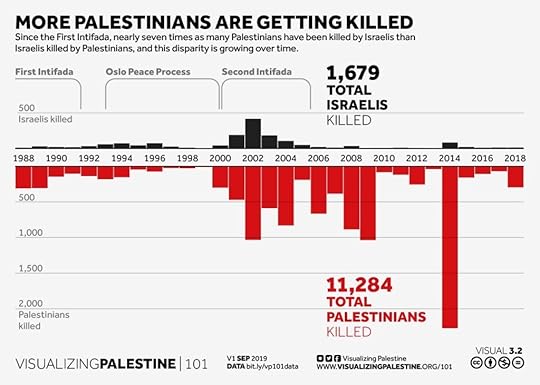
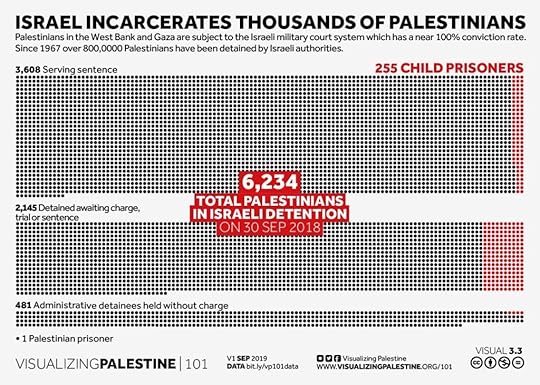
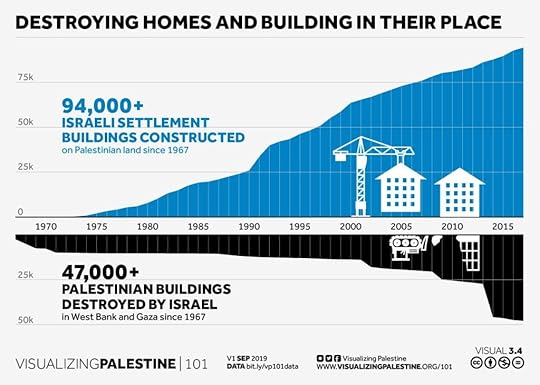
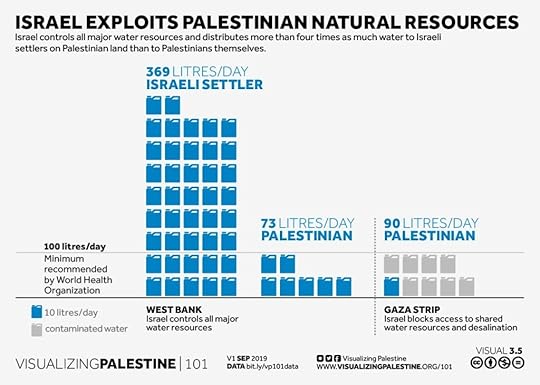
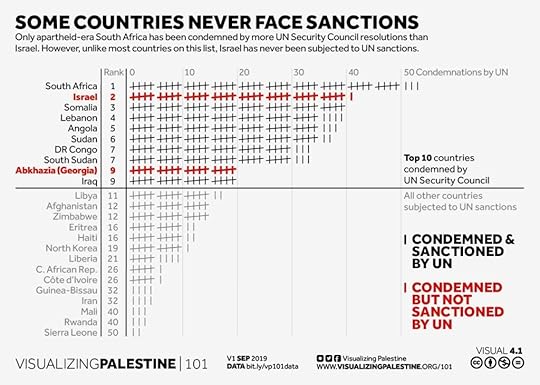
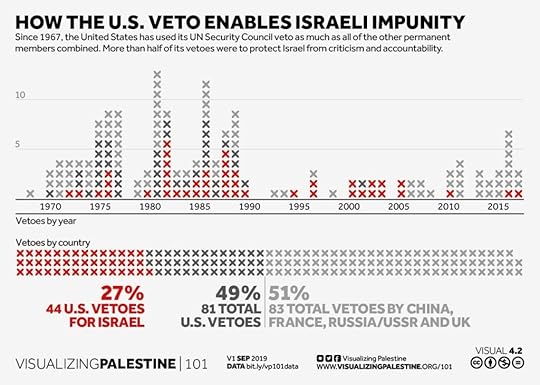
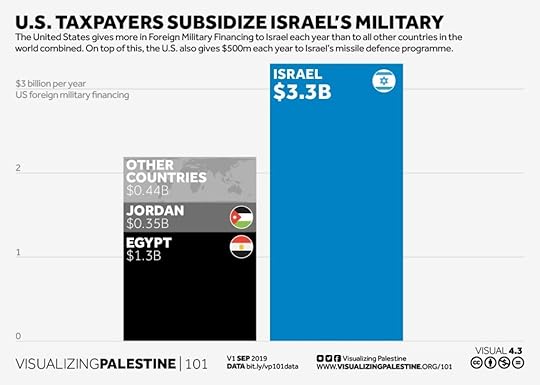
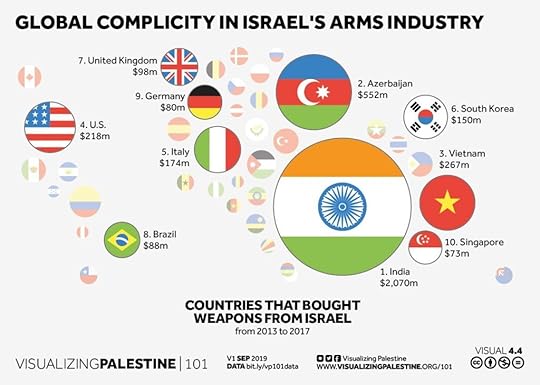
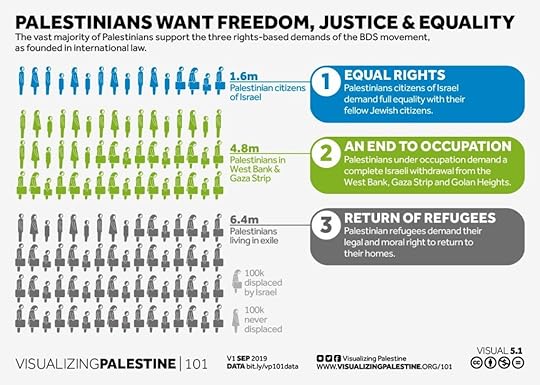
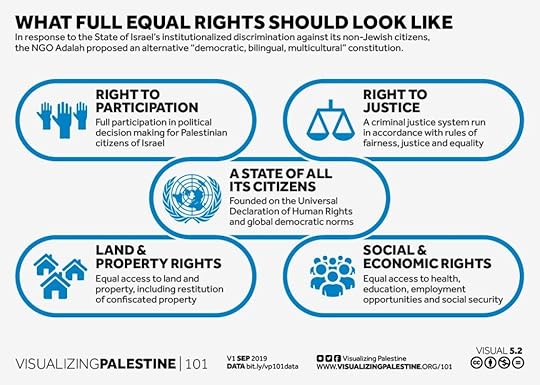
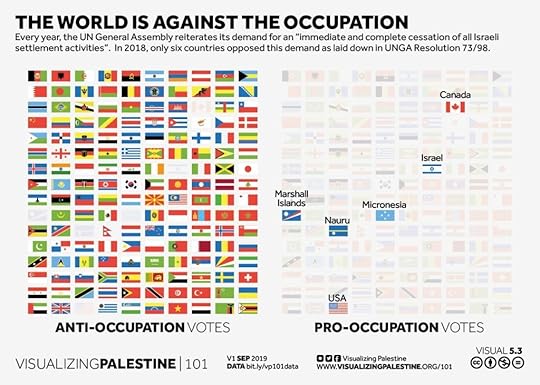
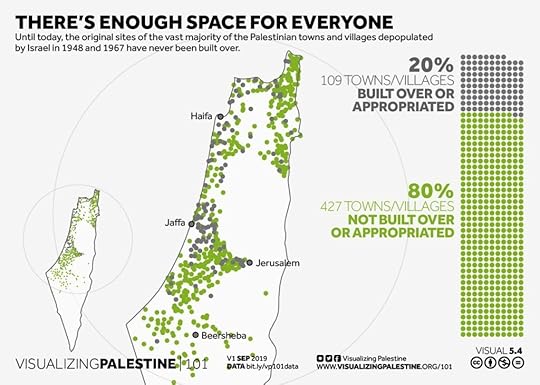
March 24, 2017
Yes, India, Israel uses water as a weapon
For the past couple of nights I’ve noticed a new commercial on English language television in India. It seems that Israel is currently promoting tourism on occupied land while hiding their reality of their almost 70-year long colonisation of the land. It seems that now that Indians no longer have a stamp in their passport preventing them from travelling to the world’s 2 apartheid states–South Africa and Israel–they’re pushing tourism, making it appear as if it were any European country. It was shocking to see such a commercial, knowing how many Indians will fall for it, travel there, and never even have a glimpse of what life is like for Palestinians in historic Palestine or the West Bank and Gaza Strip. (Here is my response to a similar piece in The Hindu a couple of years ago).
Of course, one would expect that an Israeli agency would promote its own tourism. But what’s even more shocking is that an Indian environmental organisation would fall for such propaganda. And that’s what seemed to happen with India Water Portal. Their piece was lazy–relying solely on the Israeli embassy for their misinformation. And the Indians who published this piece are too enamoured with the mythology of Israelis making the deserts bloom, they credit them with inventions like drip irrigation, which Indians were doing for hundreds–if not thousands–of years before the colony of Israel existed. They seem to be completely oblivious to the realities in Palestine, too, and the way that water is used as a tool of apartheid. Perhaps if they realised, Indian passports would once again be prohibited from entering Israel (wishful thinking, I know).
What bothers me about false reporting on water in India is that so many Indians–Indians who I expect to know better–will repeat this fib about Israel being some agricultural, water genius nation that India should look to as a model. And the Indian government is indeed stepping up its work in that area with collaborative ventures in the agricultural sector.
Israel’s water lies go far back to their early colonisation in the 1940s, but after they accelerated the colonisation of the West Bank, the theft quickened, as Charlotte Silver explains:
The Israeli military has governed all sources of water in the West Bank and Gaza since 1967 and 1974, respectively. Originally gained by military conquest, its control has subsequently been affirmed through the Oslo Accords and, increasingly, the work of the Palestinian Authority and international NGOs.
[image error]
In Gaza, because of the ongoing siege of the world’s largest open air prison, the water situation is even worse than in the West Bank, which is why the Middle East Children’s Alliance (MECA) has been actively involved in helping to create solutions to the lack of drinking water:
In the West Bank and Gaza, the Israeli Occupation systematically denies Palestinian adequate quality and quantities of water. Palestinian communities inside the state of Israel have less access to water than their Jewish counterparts, as well. Water is diverted from Palestinian resources the West Bank (and previously in Gaza) to illegal Israeli settlements and into Israel. Israel denies materials, fuel, and permits to sustain and expand water systems. Military attacks predictably—and often deliberately—destroy wells, water tanks, pipes, treatment plants, and sewage systems. Widespread poverty prevents people from purchasing clean water or repairing their wells and plumbing. The health and well being of virtually every Palestinian child and adult is affected by the shortage of clean, safe water.
The water crisis in Gaza is extreme. When the state of Israel was established in 1948, hundreds of thousands of Palestinians were driven from their homes in what is now southern Israel to the small and arid Gaza Strip. At the same time, Israel cut off access to water sources around Gaza. The only source available, the Gaza Aquifer, could not support the huge and sudden rise in population, and the water it generates has been steadily deteriorating for more than sixty years. It is currently estimated that 95% of water from the Gaza Aquifer is unfit for human consumption.
It’s pretty simple to surf the Internet and figure out the truth about water in Palestine and Israel’s role in siphoning it for their swimming pools when Palestinians barely get enough to drink, cook, and bathe with. Even Israel’s Ha’aretz has reported on the way Israel creates thirst in Palestinian communities as has the Economist. Amnesty International has published reports on Israel’s use of water as a tool of their apartheid regime.
What will it take for Indians to understand the truth, the reality of what really goes on with water in Palestine? Perhaps a trip, but not to Israel; one to the occupied territories where tourists also get first-hand experiences with inequity and water as well as all the other visible and less visible forms of apartheid.
[image error]
Filed under: Apartheid, India, Palestine, Zionism Tagged: Amnesty International, Apartheid, drip irrigation, economist, gaza strip, Ha'aretz, India, india water portal, Israel, Maia Project, meca, Middle East Children's Alliance, Palestine, the hindu, tourism, water, West Bank


March 12, 2016
McGraw-Hill Destroys Books in Response to an Anti-Palestinian Campaign
 MLA Members for Justice in Palestine
MLA Members for Justice in Palestine
Rania Khalek’s recent article for Electronic Intifada reports on the decision of McGraw-Hill to burn the textbook titled Global Politics: Engaging A Complex World because pro-Israeli groups campaigned against the inclusion of a widely-circulated image (see graphic below) of Palestine loss of land. The maps in the image illustrate Israel’s aggressive expropriation of Palestinian land from 1946 until 2000. Inside Higher Ed also reported on the decision to destroy the books because the publisher came under political pressure of Zionists who challenged the accuracy of the maps. Khalek’s article shows how the erasure of Palestinians from their historic homeland is also subject to narrative erasure as publishers cave to pro-Israeli interest groups, who seek to conceal Zionist expansionism. She also draws attention to the nefarious alignment of pro-Israeli and racist and Islamphobic pundits and bloggers, who have sought to frame Palestinian resistance in terms of Islamist militancy by denying the…
View original post 483 more words
Filed under: Palestine


June 5, 2015
Call to oppose increasing military and trade ties with Israel
 Originally posted on Palestine Solidarity Committee in India:
Originally posted on Palestine Solidarity Committee in India:
Narendra Modi is all set to be the first Indian Prime Minister to visit Israel.
This is what this “first” really means: closer military and trade ties with Israel.
Closer military ties with Israel make India complicit in Israel’s war crimes in the occupied Palestinian territories. The Israeli military industry, the largest industry in the country and perhaps the main prop of the national economy, is fully a part of the Israeli war machine that occupies Palestinian lands, makes Gaza an open air prison, and imposes apartheid policies on Palestinians.
India’s desire for closer military ties comes at a time when even Israel’s close supporters in the international community, are staying away from arms trade with Israel. Many countries such as the UK and France have declined to participate in the seventh annual Israel Defense expo that has just opened in Tel Aviv.
Closer trade ties with Israel means that…
View original 180 more words
Filed under: Palestine


January 15, 2015
Follow my new blog on Huffington Post
Posted:��06/01/2015 08:02 IST����Updated:��06/01/2015 11:28 IST
When I moved to India two years ago, I shifted from Beirut, Lebanon, as opposed to my native place, Los Angeles, California. West Asia was my home for several years as I lived and worked in Palestine, Jordan, and Lebanon teaching in universities and a high school. This experience of living and teaching abroad began my interest in what young people learn and how they learn it. Of particular interest for me are the subjects literature and history and what role they play in shaping a young person’s sense of self and sense of identity in relation to one’s larger community, a theme I plan to explore on these pages in the coming months.
Perhaps as an American I’m hyper-sensitive to the ways in which Western culture–and American culture in particular–insinuates itself around the world. I’ve seen the state of post-colonial curricula in four countries and the pattern seems the same. Young people, especially in cities, are inundated with American brands from fast “food” to blue jeans, Hollywood cinema, as well as music and books. To be sure, it’s not that India doesn’t have its own variations on these themes or that young people avoid Indian culture altogether. But the values that Americans inculcate in the children who consume its mainstream culture–which is typically all that gets exported–are troubling. Whether it’s the consumption of what��Michael Pollan calls “edible food-like substances”��that are devoid of nutrition or the��genetically modified seeds propagating rural India��or the ubiquitous presence of American fiction, I wonder how much parents and teachers question these influences with the young people in their lives.
In urban India, places like Bengaluru where I live, it’s hard not to escape the Americanisation when one finds everything from Levi’s shops to California Pizza Kitchen dominating the streets of upper-class neighbourhoods. Among the young people I know, it’s hard not to notice the increasing Americanised accents that seem to have replaced their parents’ British-inflected diction. Even more troubling are the number of young people disinterested in learning how to read and write in their native tongue.
But how is that counteracted in schools and homes? As a literature teacher I’m conscious of the ways in which culture shapes young people’s identity. Perhaps it’s a bit more challenging in a country with such a variety of languages and cultures. It’s not like it’s easy to have a laureate whose verses are sung by the masses as one finds with poets like��Mahmoud Darwish��whose lyrics are cherished across the Arab world.
Yet even in the Arab countries where I’ve lived, literature curricula is still dominated by English and French colonial antecedents, and increasingly its United States counterparts. In places like Palestine and Jordan, which the United States and Israel continue to control, to varying degrees, it’s not surprising that British and American literature are stock features.
In India, however, it’s striking to see how little Indian literature is on official Indian syllabuses used in schools. In most countries, school is the place where nationalism is codified. It’s the setting in which one learns not only his or her history, but also develops a love of one’s culture, language, and hopefully a love and respect for other people’s cultures as well. On the current��ISC (Indian School Certificate) syllabus, for example, the upcoming exam for the compulsory twelfth standard English only five Indian writers are included compared to twenty-four largely British and American authors. For the elective literature in English course for graduating seniors, teachers may select any three texts of which only one–The Hungry Tide��by Amitav Ghosh–is written by an Indian; the poetry anthology used for this course is full of what in my college days we called “dead white men”. (Eleventh standard students fare much better as they have two Indian writers they may select from the list of British authors: Kiran Desai’s��Hullaballoo in the Guava Orchard��and Vijay Tendulkar’s��Silence! The Court is in Session.)
The Kenyan novelist, Ng��g�� wa Thiong’o, has thought deeply about the role literature plays in a so-called post-colonial society. In his book of essays,��Decolonising the Mind: The Politics of Language in African Literature, he reminds us of the most insidious nature of colonialism, one that has long-term consequences even after the colonists leave: “its most important area of domination was the mental universe of the colonised, the control, through culture, of how people perceived themselves and their relationship to the world. Economic and political control can ever be complete or effective without mental control. To control a people’s culture is to control their tools of self-definition in relationship to others”.
Certainly, Indian students studying their literature in their mother tongue will be exposed to Indian literature. But given that, for better or worse, English is also an Indian language, wouldn’t it make sense to try to balance the heavily Westernised influences seeping into Indian popular culture and daily life by introducing children to more Indian writers in English? Of course in earlier grades, Indians read a smidgen of canonical writers such as R.K. Narayan, Rabindranath Tagore, Vikram Seth, Nissim Ezekiel, and Sarojini Naidju. But what if we opened up the syllabus to include the less anthologised poets like Agha Shahid Ali, Eunice de Souza, Sujata Bhatt, Nitoo Das, Sridala Swami, or Arvind Krishna Mehrotra. The number of playwrights and novelists are as abundant such as: Mulk Raj Anand, Githa Hariharan, Mirza Waheed, Habib Tanvir, Saadat Hasan Manto, or Aruni Kashyap. Widening the literary canon in India can also help lessen the divides that exist across the country by giving students a window to lesser-studied places and the people who inhabit them.
Follow Marcy Newman on Twitter:��www.twitter.com/marcynewman
MORE:
AmericanisationIndian SyllabusIndian WritersIndian CultureIndian Literature
This Blogger’s Books and Other Items��from…

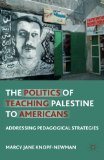
The Politics of Teaching Palestine to Americans: Addressing Pedagogical Strategies
by Marcy Jane Knopf-Newman��
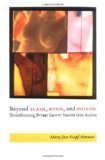
Beyond Slash, Burn, and Poison: Transforming Breast Cancer Stories into Action
by Marcy Knopf-Newman��
Filed under: Colonialism, Education, India, Literature Tagged: agha shahid ali, Amitav Ghosh, aruni kashyap, arvind krishna mehotra, bengaluru, eunice de souza, githa hariharan, habib tanvir, hollywood, isc, kiran desai, Mahmoud Darwish, michael pollan, mizra waheed, mulk raj anand, ng��g�� wa thiong'o, nissim ezekiel, nitoo das, saadat hasan manto, sarojini naidu, sridala swami, sujata bhatt

December 18, 2014
Don’t let apartheid onstage!
 Originally posted on Palestine Solidarity Committee in India:
Originally posted on Palestine Solidarity Committee in India:
Call to protest the inauguration of the 3rd Delhi International Film Festival 2014 by the Israeli Ambassador
The 3rd Delhi International Film Festival 2014, to be held from 20th to 27th December in New Delhi, will be inaugurated by the Israeli Ambassador, Daniel Carmon, and the Spokesman of the Israeli Embassy in India, Ohad Horsandi, among others. The festival is organized by The Social Circle, a civil society organization, in association with the New Delhi Municipal Corporation (NDMC). The festival is a part of the centenary celebrations of the NDMC.
Along with artists and citizens of conscience, we in the Indian Campaign for the Academic and Cultural Boycott of Israel (InCACBI, www.incacbi.in) protest against the involvement of representatives of the Israeli state in our cultural events. We believe that art and culture cannot be separated from matters of conscience and principle. The Israeli state consistently…
View original 564 more words
Filed under: Palestine


